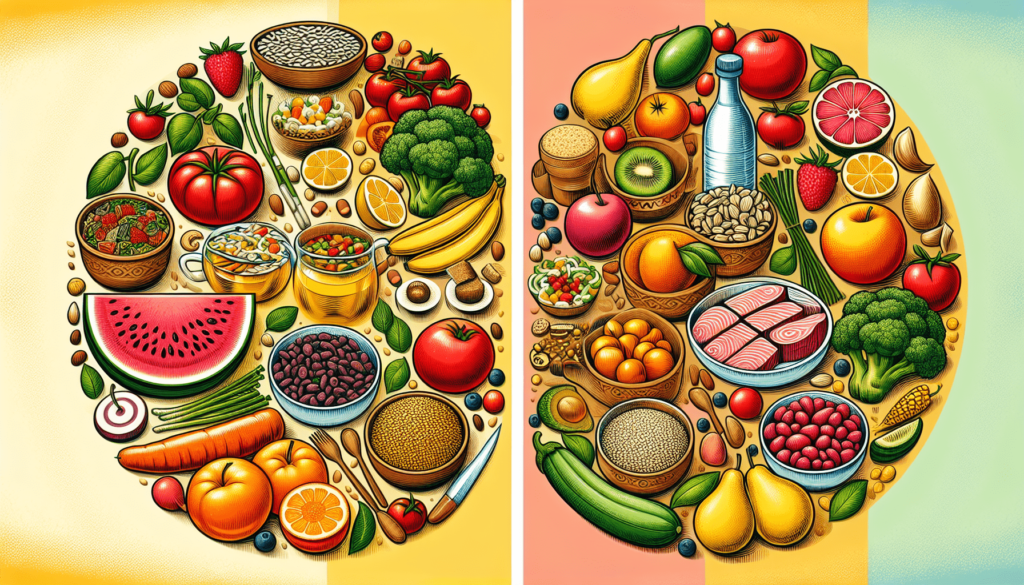If you’ve ever been curious about the world of healthy eating, then you might have come across the buzzwords “Dash Diet” and “Mediterranean Diet.” Both diets have gained popularity for their potential to improve overall health and wellbeing. But what exactly are these diets and how do they differ from each other? In this article, we will explore the key differences between the Dash Diet and the Mediterranean Diet, giving you a better understanding of their unique approaches to nutrition. It’s time to grab a seat and embark on a journey of nutritional exploration!

This image is property of images.unsplash.com.
What is the Dash Diet?
Definition and Purpose
The Dash Diet, which stands for Dietary Approaches to Stop Hypertension, is a dietary plan that aims to lower and control high blood pressure. It emphasizes the consumption of fruits, vegetables, whole grains, lean proteins, and low-fat dairy products while limiting the intake of sodium, saturated fats, and sweets. The main purpose of the Dash Diet is to reduce the risk of hypertension, improve overall heart health, and prevent chronic diseases such as heart disease and stroke.
What is the Mediterranean Diet?
Definition and Purpose
The Mediterranean Diet is a dietary pattern based on the traditional eating habits of people from countries around the Mediterranean Sea, such as Greece, Italy, and Spain. It promotes the consumption of plant-based foods including fruits, vegetables, whole grains, legumes, nuts, and seeds. Additionally, moderate amounts of fish, poultry, dairy, and red wine are also included. The Mediterranean Diet aims to promote heart health, reduce the risk of chronic diseases, and improve overall well-being.
Key Principles and Food Groups
Dash Diet Principles
The Dash Diet is based on several key principles, including:
- Consumption of fruits and vegetables: These should make up a significant portion of your daily meals, as they are rich in vitamins, minerals, and dietary fiber.
- Emphasis on whole grains: Whole grain products such as brown rice, whole wheat bread, and oats are preferred over refined grains due to their higher nutritional value.
- Lean proteins: Opt for lean sources of protein such as fish, poultry, and legumes, while limiting the intake of red meat.
- Low-fat dairy products: Choose low-fat or fat-free milk, yogurt, and cheese to minimize saturated fat intake.
- Limited sodium intake: Reduce the consumption of high-sodium foods like processed snacks, canned soups, and fast food to help control blood pressure.
Mediterranean Diet Principles
The Mediterranean Diet principles include:
- Plant-based emphasis: The diet encourages the consumption of fruits, vegetables, legumes, nuts, and whole grains-rich in nutrients and fiber.
- Healthy fats: Incorporate healthy fats like olive oil, avocados, and nuts, while minimizing the intake of saturated and trans fats.
- Moderate intake of animal proteins: While the Mediterranean Diet includes moderate amounts of fish, poultry, and dairy, it emphasizes smaller portions and less frequent consumption of red meat.
- Red wine in moderation: Red wine, when consumed in moderation, can be part of the Mediterranean Diet due to its potential heart-healthy benefits.
- Limited processed foods: Highly processed foods, high in added sugars and unhealthy fats, should be minimized or avoided.
Benefits of the Dash Diet
Impact on Blood Pressure
One of the key benefits of the Dash Diet is its positive impact on blood pressure levels. Numerous studies have shown that following the Dash Diet can significantly lower both systolic and diastolic blood pressure. The emphasis on fruits, vegetables, whole grains, and low-fat dairy products, combined with the reduction in sodium intake, contributes to blood pressure reduction.
Promotes Heart Health
The Dash Diet is renowned for its heart-healthy properties. By emphasizing nutrient-dense foods and limiting unhealthy fats, the Dash Diet can reduce the risk of heart disease and stroke. The diet’s focus on whole grains, lean proteins, and low-fat dairy products helps to maintain healthy cholesterol levels, while its high intake of fruits and vegetables ensures an adequate intake of antioxidants and phytochemicals that contribute to heart health.
Weight Loss Potential
Another advantage of the Dash Diet is its potential for weight loss. The emphasis on whole, unprocessed foods and the limitation of added sugars and unhealthy fats makes it a favorable option for those looking to shed extra pounds. Additionally, the Dash Diet promotes portion control and encourages the consumption of high-fiber foods, which can contribute to feeling full and satisfied, thus aiding in weight management.

This image is property of images.unsplash.com.
Benefits of the Mediterranean Diet
Promotes Heart Health
Similar to the Dash Diet, the Mediterranean Diet plays a key role in promoting heart health. This dietary pattern encourages the consumption of monounsaturated fats found in olive oil and avocados, which have been linked to lower rates of heart disease. The abundance of fruits, vegetables, and whole grains in this diet provides essential vitamins, minerals, and antioxidants that are beneficial for cardiovascular health.
Reduced Risk of Chronic Diseases
The Mediterranean Diet has been associated with a reduced risk of chronic diseases. Research suggests that following this diet can decrease the risk of developing type 2 diabetes, certain types of cancer, and neurodegenerative diseases such as Alzheimer’s disease. The high consumption of antioxidant-rich foods, such as fruits, vegetables, and olive oil, may be a contributing factor to this reduced risk.
Weight Management
The Mediterranean Diet is not only known for its heart-healthy benefits but also its potential impact on weight management. By emphasizing whole, unprocessed foods and incorporating regular physical activity, this diet promotes sustainable weight loss and weight maintenance. The focus on high-fiber foods, lean proteins, and healthy fats helps regulate appetite and promote feelings of fullness.
Comparison of Nutritional Guidelines
Recommended Macronutrient Composition
The Dash Diet and the Mediterranean Diet have different macronutrient compositions. The Dash Diet typically consists of about 50% of calories coming from carbohydrates, 35% from fats (with a focus on healthy fats), and 15% from proteins. On the other hand, the Mediterranean Diet is characterized by approximately 40% of calories from carbohydrates, 40% from fats (mainly monounsaturated fats), and 20% from proteins.
Emphasis on Food Groups
While both diets place a strong emphasis on plant-based foods, the specific food groups highlighted differ slightly. The Dash Diet encourages a higher intake of low-fat dairy products as a source of calcium, while the Mediterranean Diet includes more sources of healthy fats, such as olive oil and nuts. Additionally, the Dash Diet emphasizes lean proteins, while the Mediterranean Diet incorporates moderate amounts of fish and poultry.
Inclusion of Specific Foods
Certain foods are particularly encouraged or recommended in each diet. The Dash Diet encourages foods rich in potassium, magnesium, and calcium, such as bananas, leafy greens, and low-fat dairy products. In contrast, the Mediterranean Diet emphasizes the consumption of fish, olive oil, whole grains, and a variety of fruits and vegetables.

This image is property of images.unsplash.com.
Daily Meal Plan Examples
Dash Diet Sample Meal Plan
Here’s an example of a Dash Diet meal plan for one day:
- Breakfast: Oatmeal topped with berries and a side of low-fat Greek yogurt.
- Snack: Carrot sticks with hummus.
- Lunch: Grilled chicken breast with a mixed green salad dressed with olive oil and lemon juice.
- Snack: Apple slices with a handful of almonds.
- Dinner: Baked salmon with steamed vegetables and a side of brown rice.
- Dessert: Fresh fruit salad.
Mediterranean Diet Sample Meal Plan
Here’s a sample meal plan for the Mediterranean Diet:
- Breakfast: Whole grain toast topped with avocado and sliced tomatoes, alongside a cup of green tea.
- Snack: Greek yogurt with honey and walnuts.
- Lunch: Mediterranean salad with mixed greens, tomatoes, cucumbers, olives, feta cheese, and a drizzle of olive oil and balsamic vinegar.
- Snack: Sliced melon and a handful of almonds.
- Dinner: Grilled chicken breast with roasted vegetables drizzled with olive oil, served with quinoa.
- Dessert: A small piece of dark chocolate.
Scientific Evidence and Research
Clinical Studies on Dash Diet
Numerous clinical studies have demonstrated the effectiveness of the Dash Diet in reducing blood pressure levels. The Original Dash study showed a significant reduction in blood pressure in individuals following the Dash Diet, compared to those following a typical Western diet. Other studies have further supported these findings, highlighting the Dash Diet’s ability to lower blood pressure in both hypertensive and normotensive individuals.
Clinical Studies on Mediterranean Diet
Like the Dash Diet, the Mediterranean Diet has been extensively studied for its health benefits. Research has shown that adherence to the Mediterranean Diet is associated with a decreased risk of cardiovascular diseases and overall mortality. Studies have also found that this dietary pattern is linked to a reduced risk of certain types of cancer, improved cognitive function, and better weight control.
Comparison Studies
Several comparison studies have been conducted to evaluate the effects of the Dash Diet and the Mediterranean Diet on various health parameters. These studies have shown that both diets offer benefits in terms of blood pressure reduction, improvement in lipid profiles, and weight management. While the Dash Diet appears to have a more significant impact on blood pressure control, the Mediterranean Diet has been associated with a more substantial reduction in cardiovascular risk.

Suitability and Practicality
Ease of Implementation
Both the Dash Diet and the Mediterranean Diet can be relatively easy to implement, depending on personal preferences and lifestyle factors. While the Dash Diet may require more attention to sodium intake and portion control, the Mediterranean Diet offers more flexibility in food choices. Adapting and incorporating these dietary patterns into daily life can be manageable, especially with meal planning and recipe resources available.
Adherence to Dietary Lifestyle
Adhering to the Dash Diet or the Mediterranean Diet can be a sustainable and enjoyable dietary lifestyle. Both diets emphasize whole, nutrient-dense foods and discourage the consumption of processed and unhealthy options. The inclusion of a wide variety of flavors and food choices within their guidelines makes them appealing and less restrictive, increasing the likelihood of long-term adherence.
Availability of Ingredients
The availability of ingredients for both diets can vary depending on one’s location. However, as the Dash Diet and the Mediterranean Diet focus on incorporating whole, natural foods, many of the ingredients can be found in local supermarkets or farmers’ markets. With increasing accessibility to international products, finding Mediterranean Diet-specific ingredients has become easier in many regions.
Conclusion
Key Similarities and Differences
While both the Dash Diet and the Mediterranean Diet share similarities in their focus on whole, unprocessed foods and their abilities to promote heart health, they differ in their recommended macronutrient compositions, emphasis on specific food groups, and inclusion of particular foods. The Dash Diet places more emphasis on low-fat dairy, lean proteins, and reduced sodium intake, while the Mediterranean Diet highlights healthy fats, fish, and moderate wine consumption.
Individual Preferences and Goals
Ultimately, the choice between the Dash Diet and the Mediterranean Diet depends on individual preferences and goals. If blood pressure control is a primary concern, the Dash Diet may be the preferred option. On the other hand, individuals seeking a dietary pattern with broad health benefits and a focus on plant-based foods may find the Mediterranean Diet more appealing. Consulting with a healthcare professional or registered dietitian can help determine which diet aligns best with personal needs and goals.


